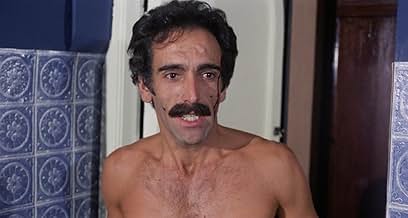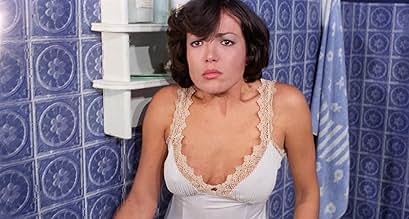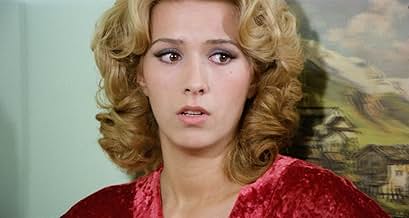CALIFICACIÓN DE IMDb
5.4/10
579
TU CALIFICACIÓN
Agrega una trama en tu idiomaA writer arrives to an isolated boardinghouse run by a beautiful but strange woman. Shortly after his arrival, guests start to get violently killed.A writer arrives to an isolated boardinghouse run by a beautiful but strange woman. Shortly after his arrival, guests start to get violently killed.A writer arrives to an isolated boardinghouse run by a beautiful but strange woman. Shortly after his arrival, guests start to get violently killed.
- Dirección
- Guionistas
- Elenco
Heinrich Starhemberg
- Daniel
- (as Henry Gregor)
Tony García Jr.
- Young Boy
- (as Tony Garcia Pablo)
León Klimovsky
- Paisano
- (sin créditos)
Opiniones destacadas
Not long after inn landlady Veronica first appeared on-screen, it became abundantly clear to me that she was barking mad, making her more than likely responsible for the series of vicious open razor murders that ensued. If it turned out that she wasn't the killer, then director León Klimovsky would be a master of deception on a par with Alfred Hitchcock (whose classic Psycho was clearly the blueprint for this film).
As I suspected, Klimovsky is no Hitchcock.
Veronica, played by lovely Ágata Lys, is easier on the eye than Norman Bates, but no less loopy, bumping off her less respectable guests in bloody fashion with the same razor that she used to do in her husband, whose persona she subsequently adopts to kill. The only occupant of the inn who she doesn't target is Daniel (Heinrich Starhemberg), a chubby, balding writer with a weak chin and terrible fashion sense to whom she takes a shine (for some inexplicable reason, he is quite the fanny magnet). Will Daniel discover the truth about Veronica before she can turn her razor on his wife Elena (Sandra Alberti), who turns up at the inn looking for her hubby?
WIth the plot providing very little in the way of genuine mystery, Klimovsky peps up his movie with plenty of mean-spirited violence (the murders aren't all that convincing, employing one of those props that squirts bright red blood from the blade, but they are still quite nasty in tone) and a fair amount of sleaze, nudity and sex: the lovely Lys gets nekkid, as does Alberti, with extra T&A from Irene Foster as pretty backpacker Anna, and Isabel Pisano as busty hooker Eva. Less appealing is the sight of Starhemberg's naked thrusting butt as he gets it on with his wife.
Trauma is a long way from a top tier giallo, but the pace is snappy and the performances fun, while the trashiness of the whole thing ensures an entertaining enough time for fans of the genre.
6.5/10, rounded up to seven for the excess of wonderfully tasteless wood panelling at the inn.
As I suspected, Klimovsky is no Hitchcock.
Veronica, played by lovely Ágata Lys, is easier on the eye than Norman Bates, but no less loopy, bumping off her less respectable guests in bloody fashion with the same razor that she used to do in her husband, whose persona she subsequently adopts to kill. The only occupant of the inn who she doesn't target is Daniel (Heinrich Starhemberg), a chubby, balding writer with a weak chin and terrible fashion sense to whom she takes a shine (for some inexplicable reason, he is quite the fanny magnet). Will Daniel discover the truth about Veronica before she can turn her razor on his wife Elena (Sandra Alberti), who turns up at the inn looking for her hubby?
WIth the plot providing very little in the way of genuine mystery, Klimovsky peps up his movie with plenty of mean-spirited violence (the murders aren't all that convincing, employing one of those props that squirts bright red blood from the blade, but they are still quite nasty in tone) and a fair amount of sleaze, nudity and sex: the lovely Lys gets nekkid, as does Alberti, with extra T&A from Irene Foster as pretty backpacker Anna, and Isabel Pisano as busty hooker Eva. Less appealing is the sight of Starhemberg's naked thrusting butt as he gets it on with his wife.
Trauma is a long way from a top tier giallo, but the pace is snappy and the performances fun, while the trashiness of the whole thing ensures an entertaining enough time for fans of the genre.
6.5/10, rounded up to seven for the excess of wonderfully tasteless wood panelling at the inn.
A writer stops off at a secluded bed and breakfast run by the battered wife of a mysterious man who spends all his time upstairs in his room. That is except when he's killing off the lodgers downstairs.
If you've seen more than 3 horror movies in your lifetime, the big twists in Trauma won't come as any big surprise, but it's not the worst film of its type and it keeps things entertaining. It features a lot more sexuality than expected with just about everyone in the film getting naked and having sex at some point. The gore effects are of the cheap variety with some razor slashes that don't completely convince.
If you've seen more than 3 horror movies in your lifetime, the big twists in Trauma won't come as any big surprise, but it's not the worst film of its type and it keeps things entertaining. It features a lot more sexuality than expected with just about everyone in the film getting naked and having sex at some point. The gore effects are of the cheap variety with some razor slashes that don't completely convince.
Trauma is very similar to Alfred Hitchcock's Psycho in that we're given an outsider who shows up to a strange secluded hotel where the owner has a big secret and people are getting murdered. For a European horror film, it's low on style and gore and feels more like a cheapo exploitation film from the U. S. around that time. There's not enough insanity to make it a worthwhile watch except for completeists.
Iolación fatal is a grim, unsettling entry in the late-70s wave of Spanish exploitation cinema, wrapped in the aesthetics of a psychological thriller but weighed down by uneven execution. While the film touches on disturbing themes and presents a few stylistic flourishes, it struggles to rise above the genre's more gratuitous tendencies.
Atmospherically, the film succeeds in creating a sense of dread. The lighting is often stark and moody, particularly in interior scenes where shadows feel like silent observers. Cinematographer Francisco Sánchez captures a creeping tension in narrow hallways and dimly lit bedrooms, often allowing the frame to linger just long enough to unsettle. Yet, this stylistic care doesn't always carry through. Some scenes fall flat visually, with pedestrian compositions or abrupt edits that undercut their emotional weight. There's a disconnect between the visual intent and the rhythm of the narrative, which makes the film feel choppy at times.
Performance-wise, the cast handles the material with varying degrees of conviction. Ágata Lys delivers a haunting and layered performance, striking a delicate balance between vulnerability and restrained strength. Her presence anchors the film, elevating scenes that might have otherwise veered into exploitation without nuance. In contrast, some supporting actors fall into melodrama, lacking the subtlety the script seems to call for. Still, even with these inconsistencies, there's a raw sincerity in several exchanges that makes the human drama feel real, if not always well-paced.
The film's major flaw lies in its tendency toward sensationalism. At points, it leans heavily on nudity and lurid scenarios to provoke rather than explore. This often blunts the psychological depth the film flirts with, leaving some scenes feeling gratuitous instead of essential. There's an undercurrent of commentary about trauma and guilt, but it never fully matures into something cohesive. Instead, the movie circles its themes, hesitant to confront them head-on.
In the end, Violación fatal is a mixed bag. It has moments of genuine tension and some striking visual choices, but it lacks the narrative focus and restraint to elevate its subject matter. Ágata Lys's performance remains the most memorable element, a compelling center in a film that too often drifts toward exploitation without clear purpose.
Atmospherically, the film succeeds in creating a sense of dread. The lighting is often stark and moody, particularly in interior scenes where shadows feel like silent observers. Cinematographer Francisco Sánchez captures a creeping tension in narrow hallways and dimly lit bedrooms, often allowing the frame to linger just long enough to unsettle. Yet, this stylistic care doesn't always carry through. Some scenes fall flat visually, with pedestrian compositions or abrupt edits that undercut their emotional weight. There's a disconnect between the visual intent and the rhythm of the narrative, which makes the film feel choppy at times.
Performance-wise, the cast handles the material with varying degrees of conviction. Ágata Lys delivers a haunting and layered performance, striking a delicate balance between vulnerability and restrained strength. Her presence anchors the film, elevating scenes that might have otherwise veered into exploitation without nuance. In contrast, some supporting actors fall into melodrama, lacking the subtlety the script seems to call for. Still, even with these inconsistencies, there's a raw sincerity in several exchanges that makes the human drama feel real, if not always well-paced.
The film's major flaw lies in its tendency toward sensationalism. At points, it leans heavily on nudity and lurid scenarios to provoke rather than explore. This often blunts the psychological depth the film flirts with, leaving some scenes feeling gratuitous instead of essential. There's an undercurrent of commentary about trauma and guilt, but it never fully matures into something cohesive. Instead, the movie circles its themes, hesitant to confront them head-on.
In the end, Violación fatal is a mixed bag. It has moments of genuine tension and some striking visual choices, but it lacks the narrative focus and restraint to elevate its subject matter. Ágata Lys's performance remains the most memorable element, a compelling center in a film that too often drifts toward exploitation without clear purpose.
TRAUMA is a late entry in the career of Spanish horror director Leon Klimovsky. Like A DRAGONFLY FOR EACH CORPSE and BLUE EYES OF THE BROKEN DOLL, it's a Spanish-themed giallo, although the actual inspiration is much more obvious: like SISTERS before it, this is a film which owes its existence to Hitchcock's PSYCHO.
The setting is rural Spain and a slightly run-down boarding house occupied by the usual oddballs including a writer and a couple of sexed-up couples (well, it was the 1970s). Before long a series of brutal razor slayings are taking place, and the viewer is left wondering who's responsible. Well, not really; the identity of the killer is blindingly obvious from the outset, but this doesn't detract from the film's entertainment value. Brutal murders, violent flashbacks, and a sedate pace follow.
The huge bonus here is Klimovsky's exemplary direction; this is a guy who could take a low budget and always make his film look fantastic. A succession of effective establishing shots and an emphatic, low key score combine to give the whole film a sinister atmosphere. The photography is good enough to keep things interesting despite the slow pace and lack of action. The gore is a bit shoddy, but the film feels very brutal nonetheless, and the climax is worth waiting for.
The setting is rural Spain and a slightly run-down boarding house occupied by the usual oddballs including a writer and a couple of sexed-up couples (well, it was the 1970s). Before long a series of brutal razor slayings are taking place, and the viewer is left wondering who's responsible. Well, not really; the identity of the killer is blindingly obvious from the outset, but this doesn't detract from the film's entertainment value. Brutal murders, violent flashbacks, and a sedate pace follow.
The huge bonus here is Klimovsky's exemplary direction; this is a guy who could take a low budget and always make his film look fantastic. A succession of effective establishing shots and an emphatic, low key score combine to give the whole film a sinister atmosphere. The photography is good enough to keep things interesting despite the slow pace and lack of action. The gore is a bit shoddy, but the film feels very brutal nonetheless, and the climax is worth waiting for.
¿Sabías que…?
- TriviaHeinrich Starhemberg (aka Henry Gregor), as Daniel, is also the movie's executive producer.
- ErroresWhen Daniel Meets Veronica for the first time, she accidentally drops a wine bottle on the floor smashing it. in the next shot the broken bottle and the spilled wine are not seen.
- Créditos curiososThe closing credits appear on a still photography of one of the characters.
- ConexionesReferences El lobo humano (1941)
Selecciones populares
Inicia sesión para calificar y agrega a la lista de videos para obtener recomendaciones personalizadas
- How long is Trauma?Con tecnología de Alexa
Detalles
- Tiempo de ejecución1 hora 27 minutos
- Mezcla de sonido
- Relación de aspecto
- 1.85 : 1
Contribuir a esta página
Sugiere una edición o agrega el contenido que falta

Principales brechas de datos
By what name was Trauma (1978) officially released in India in English?
Responda

























